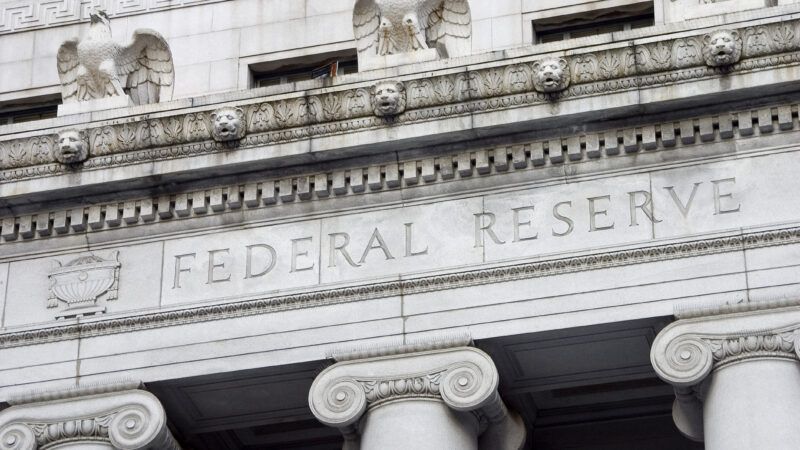The Real Threat to Fed Independence Isn't Trump. It's Congress' Debt Addiction.
The president's clear attempt to interfere in the Federal Reserve is not a one-off crisis.

Concerns about the Federal Reserve's independence have grown following repeated attacks by President Donald Trump, including this week's decision to fire Fed Governor Lisa Cook based on questionable allegations. But this debate is too narrowly focused on the president's political pressure, ignoring a growing danger in our system.
It is true that since the Treasury-Federal Reserve Accord of 1951, the Fed has had operational independence—the ability to set interest rates day to day—without any obligation to make government borrowing cheap. But it never had true economic independence because the bank's monetary policy cannot be insulated from the effect of fiscal policy, and vice versa.
As public debt grows, the link becomes more visible and fiscal dominance—which occurs when a central bank like the Fed becomes subordinate to the government's fiscal policy—looms larger.
For instance, fiscal policy can happen in the name of financial stability, like it did in the U.K. in 2022. When former Prime Minister Liz Truss unveiled unfunded tax cuts and new spending, bond markets collapsed. The Bank of England was compelled to intervene and buy long-dated bonds "on whatever scale necessary." The official justification was financial, but the underlying dynamic was fiscal dominance. The bank had to postpone inflation-fighting measures to cope with a fiscal decision.
Fiscal dominance also occurs in the name of fiscal sustainability. Some economists, including me, have wondered whether there was more to the Fed's hesitation to raise interest rates when inflation took off in 2021 than a misread of a situation it called "transitory." The motivation for fiscal dominance was there. Then and now, higher interest rates mean higher interest payments, more borrowing, and a higher deficit.
As University of Virginia economist Eric Leeper recently wrote, for the first time ever, the president is now making the connection explicit. Trump is demanding lower rates on the grounds that high interest payments on government debt are "costing taxpayers trillions." That's the textbook logic of fiscal dominance, and a return to the pre-1951 thinking.
In contrast, the 1980s offered an example of a Fed chairman refusing to submit to fiscal dominance. When Paul Volcker raised interest rates to fight inflation that jumped from 11 percent in August 1979 to more than 17 percent in October 1980, he made it clear to former President Ronald Reagan that, regardless of the fiscal consequences, he would not back down. The rates would stay high for as long as necessary. Volcker even pressed Congress to do its part in fighting inflation by cutting spending.
Volcker understood the interplay between monetary policy and fiscal policy. Over time, through a series of tax increases and eventual consolidation under former President Bill Clinton, it was fiscal policy that adjusted to support disinflation.
Debt levels were much lower then. Today, the arithmetic is far less forgiving, and our Congress is missing in action. Our debt is more than 100 percent of gross domestic product. Interest payments are rising and already absorb nearly one-fifth of federal spending. If legislators deal with Social Security and Medicare's insolvency through increased borrowing instead of meaningful reforms, the debt will explode.
What pundits who are correctly concerned about Fed independence ignore is that Trump's clear attempt to interfere is not a one-off crisis; it's something that could become an enduring feature of high-debt politics.
Congress is subject to a simple, macroeconomic constraint: All government outlays, including interest payments, must ultimately be financed by some combination of taxes, borrowing, or monetary policy. When interest payments rise, the burden will be carried somewhere. If Congress won't collect more tax revenue or exercise more spending and borrowing restraint, that leaves monetary policy, which means suppressing interest rates or tolerating higher inflation to erode the real value of our debt.
So, those who only care about Trump's public browbeating of Fed Chair Jerome Powell miss the most crucial point: The pressure on the Fed will continue to exist no matter who occupies the Oval Office thanks to the fiscal trajectory that was locked in years ago and Congress' refusal to do anything about it.
The implications of chronic fiscal stress are sobering. Inflation pressure is unlikely to be quelled. Indeed, it's misleading to say that the Fed alone controls inflation. It can do so only if fiscal policy is aligned with that task. Fed independence, in a narrow political sense, becomes irrelevant when the arithmetic of debt service dictates outcomes.
Without slower spending growth and real budgetary reforms, no amount of monetary maneuvering can restore stability. The question is not whether Powell, or his successor, will resist Trump's demands. It's whether Congress will behave in a way that allows the Fed to do its job.
COPYRIGHT 2025 CREATORS.COM


Show Comments (18)